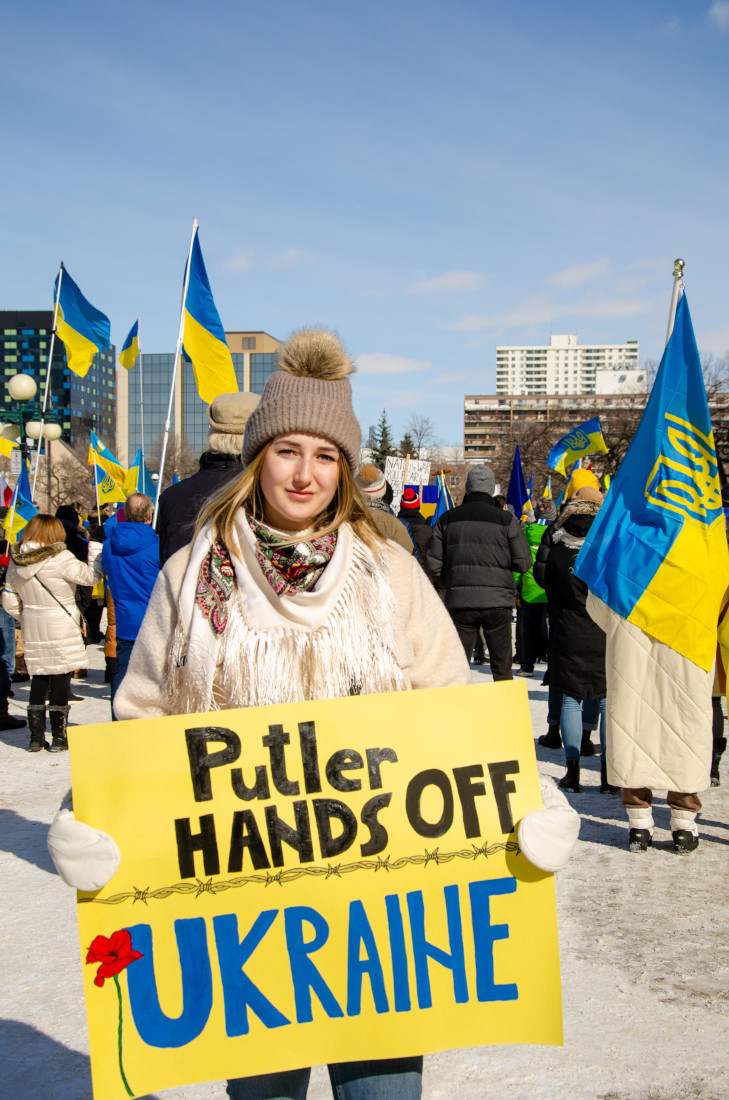Crisis in Ukraine
Members of diaspora urge Manitobans to help
Mariia Tovpa holds a sign protesting Russia’s war on Ukraine at the Manitoba Legislature on March 13. (Photo by Keeley Braunstein-Black)
As a recent CBC article pointed out, Canada “has the second-largest Ukrainian diaspora group in the world after Russia” prior to the invasion. Manitoba is the province with the highest proportion of Ukrainians, with more than 180,000 people identifying as such. This group, which has been present in Manitoba for more than 100 years, has profoundly impacted the province.
Mariia Klimovska, who hails from Ukraine and lives in Manitoba, says the best way to help Ukrainians is to donate money. “They are getting a lot of things (in care packages) from Europe, and it’s actually so much faster, so all they need are funds,” she says.
Klimovska also says she is “really hopeful” that Manitoba will welcome Ukrainian refugees.
“People are running from their homes, leaving behind so much,” she says.
Klimovska says her family, from central Ukraine, has decided to leave, but it was a difficult decision.
“My dad stayed in the town because he is helping to fix cars, helping with whatever he can,” she says. Her paternal grandmother’s decision to stay also contributed to her father’s decision.
“A lot of families are leaving behind their grandparents, because they just don’t want to leave, and it’s really hard,” Klimovska says.
The United Nations High Commissioner for Refugees estimates that more than 3 million people have fled Ukraine since the invasion began on Feb. 24.
Anna Shypilova, a second-year University of Manitoba (U of M) student from Ukraine, is involved with the U of M Ukrainian Student Association.
“We’re organizing fundraising events to support students ... and to help Ukraine,” she says. Shypilova is currently an event manager with the group.
“We are also focusing on using social media,” she says, adding that they aim to share information about the crisis from trustworthy sources, as well as information about mental-health support for affected students.
“I know there are a lot of (Ukrainian) students who are so distracted, so it’s really hard to study right now,” Shypilova says.
“I’ve been telling everyone over the past few weeks that my parents who are in Ukraine and myself have been trying to stay optimistic, because we do believe that everything is going to be fine, but we will need a lot of strength afterwards to rebuild our culture and our cities.”
“I’m trying to cheer up my parents and be optimistic,” Shypilova says.
Klimovska shares this optimism. “(Russian president Vladimir) Putin was giving Ukraine three days to give up, but we’re still standing,” she says.
Many organizations have been collecting funds for Ukraine and Ukrainians. The Canadian Red Cross’ donation page can be accessed at donate.redcross.ca/page/100227.
Published in Volume 76, Number 21 of The Uniter (March 17, 2022)






